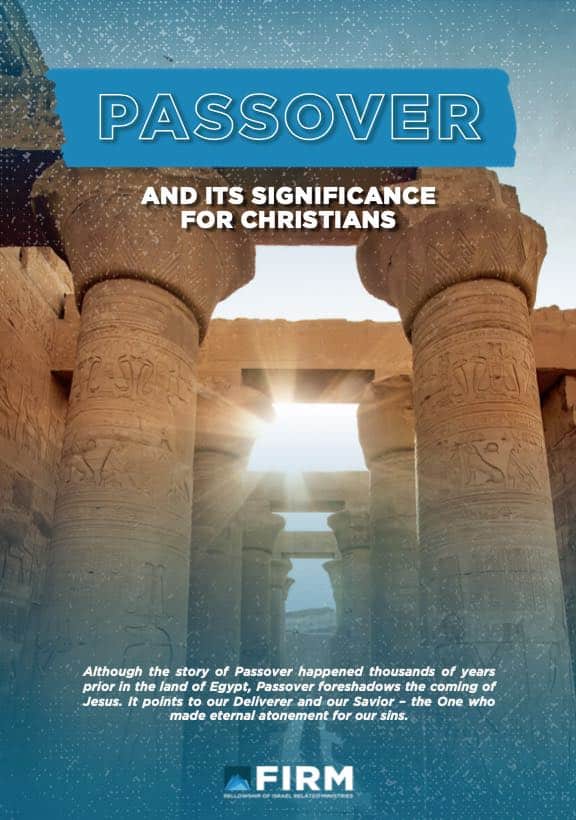What is Passover?
Passover, or Pesach in Hebrew, stands as one of the most significant feasts in both Jewish and Christian traditions. The story of Passover is first described in the Old Testament, and it commemorates the Israelites’ miraculous exodus from Egypt and their transition from slavery to freedom.
What’s important however is that this historical and spiritual event is not only foundational to the Jewish faith but holds profound significance for Christians. It weaves together the narratives of the Old and New Testaments in a rich tapestry of redemption and deliverance.
The Biblical Story of Passover
The Book of Exodus, chapters 12 through 14, records the story of Passover. It unfolds in a context where Egyptians enslave the Israelites. The Israelite slaves cry out to God for deliverance. God responds by sending Moses to lead His people to freedom.
However, God hardens Pharaoh’s heart. Pharaoh refuses to let the Israelites go. Even though Egyptian magicians try to match the miracles Moses performed in the name of the Lord, God’s power always proves superior. And yet, the Pharaoh doesn’t budge.
As a result, Egypt receives punishment through ten devastating plagues, with the tenth plague being the most tragic of them all. The firstborn in any house that is not marked by the blood of a lamb on its doorposts and lintel is subject to death.
This final plague breaks Pharaoh’s resistance. It affects him painfully. This leads to the Israelites’ dramatic escape from Egypt, but it happened only after the events of the Passover night unfolded.
The Fateful Passover Night
The Passover night was a pivotal moment in the history of the Hebrews in Egypt. Moses warned Pharaoh of the impending disaster, and he also relayed the divine command for the Hebrews to prepare for this fateful night.
The Israelites were to select a lamb without blemish, slaughter it at twilight, and mark their doorposts with its blood. Although the instructions may have seemed arbitrary, following them was a powerful act of faith. It signified that the Hebrews put their trust in God’s promise of protection and deliverance.
On the night of the Passover, gathered in their homes, they anxiously awaited the unfolding events. As darkness descended, the solemn atmosphere was heightened by the knowledge of the judgment that was to come upon Egypt.
The people’s hearts were heavy with anticipation and fear, yet bolstered by their trust in God’s faithfulness. However, across Egypt, a sense of dread permeated the air as death swept through the land.
The Path to Freedom
An angel of God claimed the lives of every firstborn, from the royal palace to the humblest dwelling. Yet, as the destroyer passed over the homes marked with the blood of the lamb, the Hebrews were spared.
Amidst the cries of mourning echoing throughout Egypt, the Hebrews emerged from their homes, a people set free from bondage and oppression.
The Passover night became a symbol of God’s faithfulness and redemption, commemorated annually by the Hebrews as a reminder of their deliverance from slavery. It was also the beginning of their journey toward freedom and the Promised Land.
What is the Big Deal about the Passover Lamb?
The Passover lamb is central to the whole story of Exodus and the festival that was later established to commemorate it. It symbolizes the sacrifice that spared the Israelites from the judgment of the tenth plague.
On the night of the plague, the Hebrews were instructed to eat the lamb with bitter herbs and unleavened bread, standing ready to depart at a moment’s notice. The slaughtered lamb protected them, but it also nourished them.
This meal, the Passover Seder, richly abounds in symbolism, and the Jewish people observe it to this day as a reminder of God’s deliverance.
Theological Significance in Christianity
For Christians, the Passover is not merely a historical account; it’s a foreshadowing of the ultimate sacrifice of Jesus Christ, often referred to as the “Lamb of God.”
In the New Testament, particularly in the Gospels and the letters of Paul, we see Jesus as fulfillment the role of the Passover lamb whose blood was shed for the redemption of humanity. His crucifixion coincides with Passover, marking a new covenant between God and His people.
This parallel draws a direct line from the liberation of the Israelites to the spiritual liberation offered through Christ’s sacrifice.
The Apostle Paul explicitly makes this connection in 1 Corinthians 5:7, stating, “For Christ, our Passover lamb, has been sacrificed.” This articulation underscores the continuity between the Jewish feast of Passover and the Christian celebration of Easter.
Paul highlighted the shared heritage and the fulfillment of Old Testament prophecies through the life, death, and resurrection of Jesus.
Why Passover is Relevant to Christians
Passover’s relevance to Christians extends beyond the symbolism of the Passover lamb. But make no mistake, it is all about Jesus. The story serves as a profound narrative of redemption. It reflects God’s desire to liberate humanity from the bondage of sin and death.
Just as the Israelites experience deliverance from physical slavery in Egypt, the Messiah offers to liberate each one of us from spiritual slavery.
Moreover, Passover encourages reflection on themes of judgment, mercy, and faith. The fateful night of Passover in Egypt was a moment of liberation for many. But at the same time, it brought pain and judgment over those who did not know where their redemption lies.
Thus, in observing or studying Passover, the holiday reminds Christians of God’s sovereignty and His provision for salvation. Most of all, though, it reminds us of the promise of eternal life through Jesus the Messiah.
Will you Observe Passover this Year?
Passover represents a bridge between the Old and New Testaments. It illustrates God’s unchanging purpose of redemption throughout history—far beyond the story of Passover itself.
It’s a story that resonates with the core of Christian faith, emphasizing hope, deliverance, and the transformative power of God’s love.
Through the lens of Passover, believers are invited to appreciate the depths of God’s plan for humanity, celebrating the freedom that comes from being part of God’s family.

Passover and Its Significance for Christians: Free PDF Download
Passover is one of the seven feasts, often called “the appointed times,” listed in the Hebrew Scriptures. It is one of the most well known Jewish holidays.
When you request this PDF you’ll get the bonus of receiving fascinating articles, an exclusive insider view into what God is doing in Israel today, plus weekly updates.
Articles Related to What is Passover? Its Biblical Roots and Relevance to Christians
Estimated reading time: 6 minutes


